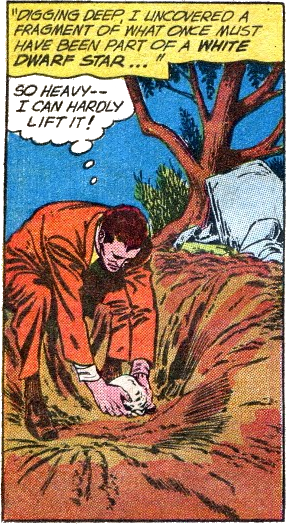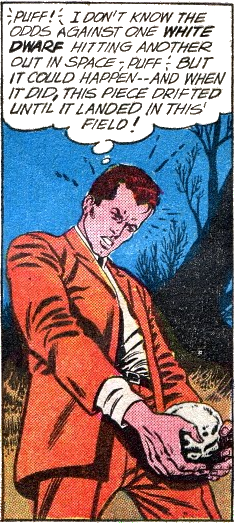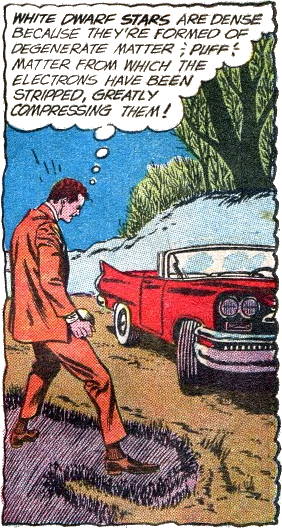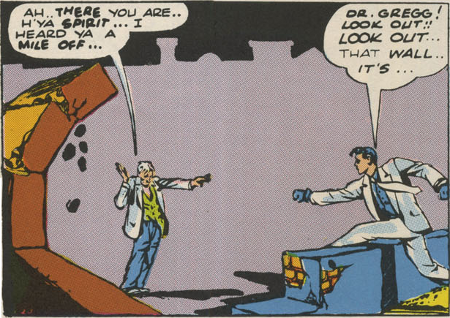Is he in hell?
Friday, 16 July 2010
I'm rather a fan of the Scarlet Pimpernel (1934), and the reasons are largely to be found within about 8 ½ of its 97 minutes. I offer those 8 ½ minutes here in a clip. The excerpt can be understood without being set-up; all the essentials can be inferred as one watches. So you may want to skip ahead to watch the video. But, for those of you more comfortable with more context, I'll provide some:
La Révolution française is cutting-off heads by scores daily. (There is some confusion in the movie over the year in which la Terreur began.)
Percy Blakeney had married Marguerite St. Just about a year earlier. Some time after the marriage, he learned that Marguerite had been instrumental in bringing-about the execution of a French aristocrat and his family. Not knowing that she had been tricked into providing the information that had led to that execution, Percy asked her about it. Marguerite, given to impetuosity, did not explain, but angrily admitted that she had. Percy began paying for the fact that he loved — that he still loved — Marguerite, by adopting the identity of the Scarlet Pimpernel (the red pimpernel being a wildflower) and forming a team, the League of the Scarlet Pimpernel, who enter France in disguise, to steal political prisoners from la guillotine. The identity of the Scarlet Pimpernel is unknown to all but members of the League. Blakeney further secures his secret — and pushes away his wife — by adopting the persona of a fop.
Marguerite's brother, Armand, part of the League, has been taken prisoner in France. Chauvelin, an agent of the French, has offered to surrender a key piece of evidence against Armand if she will reveal to Chauvelin the true identity of the Pimpernel. Unaware that the Scarlet Pimpernel is Percy, she has done what she could. Last night, she learned and reported to Chauvelin that the Scarlet Pimpernel would at mid-night be in the library of an estate where a party was being held.
When Chauvelin went to the library, Percy was there, pretending to sleep on a love-seat. Chauvelin eyed him suspiciously, but then adopted a derisive expression. Shortly after mid-night, Chauvelin himself briefly fell asleep, then awoke to find a mocking note from the Pimpernel, with Percy still apparently asleep. Chauvelin glanced at Percy as if dismissively, and then left. Percy arose, and wondered how Chauvelin had come to be there and whether his dismissal were sincere.
As the clip begins, Lord and Lady Blakeney are returning home.
There's all kinds of things right with the scenes in this clip.
When Marguerite comes to speak with Percy, we see that his affectation of effeminacy is, as much as anything, a very bitter way of rejecting her. Harry Stack Sullivan once wrote Hate is love turned angry
, and when Marguerite says You … hate me.
she's not far from the truth. However, Percy's question in reply isn't merely rhetorical; he truly wants to know why she denounced the Marquis de St. Cyr. At the least Percy wants to see what sort of person she really is, but what he really wants is some vindication for her actions, so that his love for her will not have been — will not be — wrong.
After he hears her explanation of what really happened with respect to the Marquis and his family, there remains the issue of Marguerite's trade with Chauvelin. Note the desperation in Percy's voice. He doesn't just need the information qua Scarlet Pimpernel; he wants to know whether, after all, she's still done something dreadful. He want to feel free to love her. When he learns what she gave to Chauvelin (a report that the Pimpernel would be in the library at mid-night), Percy is almost ready to laugh aloud from relief. And watch Leslie Howard's left hand, as he raises it up, partly into frame, almost to his heart, his fingers flexing; his character wants to reach out and take hold of Marguerite.
When Marguerite says that the Pimpernel might be going to his death, and Percy says Well, that's all the fellow lives for
, he's really now talking of how he has been living. That demmed, elusive Pimpernel has not been in Heaven. But now he's climbing out of Hell.
The subsequent meaning of Percy's body language is obvious to the audience. The rest of their interaction is, of course, two people speaking of their love one for another, with one of them almost oblivious to what is being said, as she doesn't recognize the relationship amongst referents. Almost oblivious, but as Percy leaves the room, Marguerite knows that there's something that she isn't seeing clearly.
The principal reason that the story-telling in this clip stays with me is because it has a moment ![[Marguerite, suddenly reälizing who the Scarlet Pimpernel is]](http://www.oeconomist.com/blogs/daniel/wp-content/uploads/2010/07/marguerite_1.jpg) where pieces all click together in the mind of one of the characters, revealing something important.
where pieces all click together in the mind of one of the characters, revealing something important.
For a moment of this sort to work, it's important that the character not have been positioned for the reälization before hand. Rather than having some twit finally see something that he or she should have seen all along, the story needs to put that character in possession of a new datum (preferably no more than one) and then have the character's mind move with fair intelligence towards the reälization.
I love the way that Merle Oberon presents Marguerite's reäctions, all within a matter of seconds. She questions her reasoning. ![[Marguerite, overtly reäcting to the reälization]](http://www.oeconomist.com/blogs/daniel/wp-content/uploads/2010/07/marguerite_2.jpg) As she looks again at the painting, her mouth is asymmetrical as she moves towards laughter
As she looks again at the painting, her mouth is asymmetrical as she moves towards laughter ![[Marguerite, almost laughing]](http://www.oeconomist.com/blogs/daniel/wp-content/uploads/2010/07/marguerite_3.jpg) at the deception Percy has effected. But the joke is displaced in her mind and her expression moves towards a smile of a different, symmetric sort
at the deception Percy has effected. But the joke is displaced in her mind and her expression moves towards a smile of a different, symmetric sort ![[Marguerite, almost smiling]](http://www.oeconomist.com/blogs/daniel/wp-content/uploads/2010/07/marguerite_4.jpg) as she starts to think that her Percy is a better man than she had come to think him, and indeed a better man than she had thought him when they married. She doesn't get very far with that thought, as it hits her
as she starts to think that her Percy is a better man than she had come to think him, and indeed a better man than she had thought him when they married. She doesn't get very far with that thought, as it hits her ![[Marguerite, seized with fear and with grief]](http://www.oeconomist.com/blogs/daniel/wp-content/uploads/2010/07/marguerite_5.jpg) that Percy has sailed off not only into danger but into danger that she has caused to be greatly increased.
that Percy has sailed off not only into danger but into danger that she has caused to be greatly increased.


![[Ted Knight, disturbed in bed, takes off his pajamas under which he has his Starman costume]](wp-content/uploads/2010/07/starmanpj_450x233.gif)




![[logo: The Doll Man by Wm. Erwin Maxwell]](wp-content/uploads/2009/08/dollman_0.png)
![[image of the tiny Doll Man punching a regular-sized villain]](wp-content/uploads/2009/08/dollman_1.png)
![['So! You're the Doll Man! Now I know why criminals quake at the mention of your name!']](wp-content/uploads/2009/08/dollman_2.png)
![['Moon of the Wolf' pg3 panel 3]](wp-content/uploads/2009/05/batman_moonofthewolf_3_3.png) then he immediately jumps after her
then he immediately jumps after her ![['Moon of the Wolf' pg3 panel 4]](wp-content/uploads/2009/05/batman_moonofthewolf_3_4.png) pushes off something because she's been accelerating under gravity
pushes off something because she's been accelerating under gravity ![['Moon of the Wolf' pg3 panels 5 and 6]](wp-content/uploads/2009/05/batman_moonofthewolf_3_5-6.png) and figures-out what he'll do on the way down
and figures-out what he'll do on the way down ![['Moon of the Wolf' pg3 panel 6]](wp-content/uploads/2009/05/batman_moonofthewolf_3_7.png) because he's the g_dd_mn'd Batman, when there's no hope…
because he's the g_dd_mn'd Batman, when there's no hope… Buchanan writes
Buchanan writes ![[Page 0 of Coded Wisdom Comics, OKRAY]](wp-content/uploads/2009/03/okray_sm.jpg)
![[image of Professor Jeff King wrestling-on the Rocket Man suit for the first time]](wp-content/uploads/2008/07/coffinsuits.png) The male lead, Tristam Coffin, looks notably older than his 40 years, as if from hard living or merely from a hard life. (Coffin has one of those
The male lead, Tristam Coffin, looks notably older than his 40 years, as if from hard living or merely from a hard life. (Coffin has one of those ![[image of NYC, as it is being destroyed by Dr Vulcan, with the use of the Decimator]](wp-content/uploads/2008/07/nyc_rocketmen.png) BTW, did you know that, if you jump out of a speeding car, all that happens to you is that you get a little dusty? Well, neither did I.
BTW, did you know that, if you jump out of a speeding car, all that happens to you is that you get a little dusty? Well, neither did I.